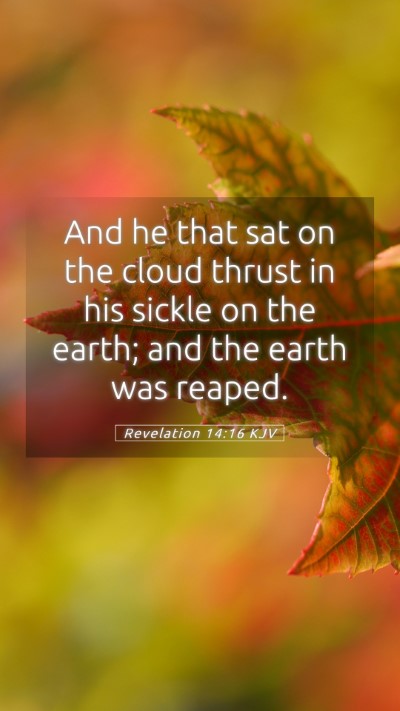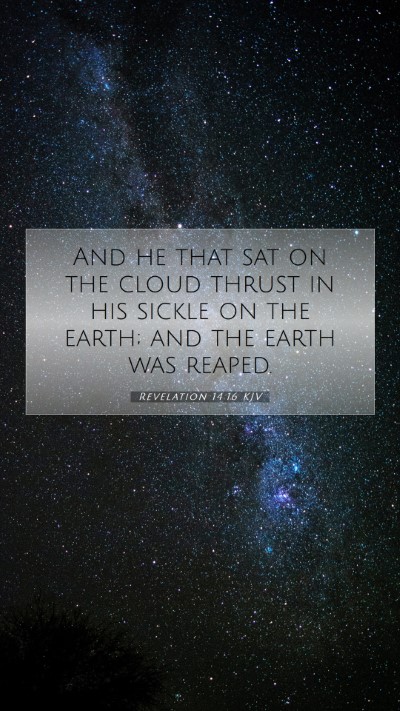Understanding Revelation 14:16
The verse Revelation 14:16 states: “And he that sat on the cloud thrust in his sickle on the earth; and the earth was reaped.” This passage is rich in meaning and significance, particularly in the context of biblical prophecy and eschatology. Below, we explore its implications through the lens of various public domain commentaries, including insights from Matthew Henry, Albert Barnes, and Adam Clarke.
Context and Background
The Book of Revelation is known for its prophetic imagery and profound messages about the end times. In Revelation 14, the imagery of harvest is prominently featured, symbolizing judgment and the culmination of God’s plan for humanity. The figure on the cloud is often interpreted as Christ, who is depicted as the divine judge.
Key Themes in Revelation 14:16
- The Authority of Christ: The one “that sat on the cloud” represents Christ's authority in executing judgment. His position indicates sovereignty over the earth.
- The Call to Harvest: The act of thrusting in the sickle suggests a decisive action—gathering the harvest which symbolizes the righteous, as well as the gathering of the wicked for judgment.
- The Final Judgment: This verse alludes to the ultimate reaping of souls at the end of times, a recurring theme throughout Scripture that emphasizes the importance of readiness and righteousness.
Bible Verse Meanings
The meanings behind Revelation 14:16 can be interpreted through various lenses:
- Matthew Henry's Commentary: Henry emphasizes the authority of Christ and the urgency of His judgment. He notes that the sickle signifies the completeness of God’s plan, where every action leads to the fulfillment of His promise.
- Albert Barnes’ Commentary: Barnes points out that this harvest represents the gathering of believers into God’s kingdom and serves as a stark reminder of the impending judgment for those who have chosen to reject God's grace.
- Adam Clarke’s Commentary: Clarke focuses on the metaphor of reaping, illustrating it as a transition from the earthly experience to eternal life. He discusses the implications for believers and the need for vigilance.
Symbolism and Significance
In Revelation 14:16, the sickle serves as a powerful symbol in biblical exegesis:
- Sickle: Traditionally associated with harvest, the sickle embodies the dual nature of God's judgment—both mercy for His people and justice for the unrepentant.
- Cloud: The cloud symbolizes divine presence and authority, reminiscent of God's appearances in the Old Testament, signifying glory and the fulfillment of divine promises.
Applying Revelation 14:16 to Daily Life
This verse encourages believers to reflect on their lives and the choices they make:
- Spiritual Readiness: Just as the harvest is gathered at the appointed time, individuals should examine their relationship with God and ensure they are living in accordance with His will.
- Community Impact: The message calls for believers to engage in their communities, sharing the Gospel and helping others understand the urgency of spiritual harvest.
Cross References
For a deeper understanding of Revelation 14:16, consider these related verses:
- Matthew 13:39-43: The parable of the wheat and the tares, focusing on the final harvest.
- Joel 3:13: A prophetic call to the harvest in the context of judgment.
- Revelation 14:14: The son of man reaping the harvest, closely tied to the imagery of this verse.
Conclusion
Revelation 14:16 invites believers to understand the gravity and hope encapsulated in the return of Christ. The imagery of harvest serves as both a warning and a promise—a call to be spiritually vigilant and actively participate in God's redemptive work. This detailed analysis of the verse aligns with the keywords and discussions held in Bible study groups, enhancing one's understanding and appreciation of Scripture.
Explore More: For further insights into Bible verse meanings, interpretations, and explanations, consider engaging with various Bible study resources, guides, and courses that facilitate a deeper understanding of Scripture and its application in our lives.


